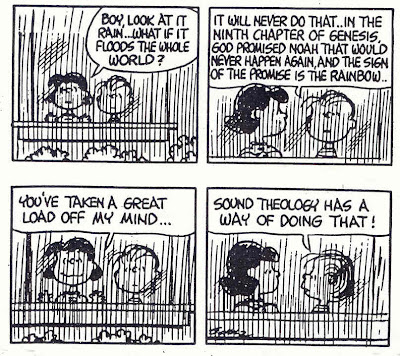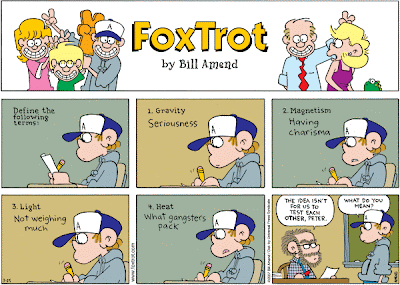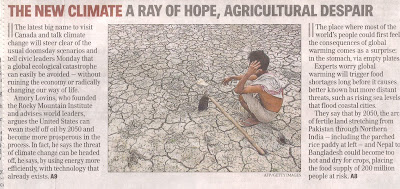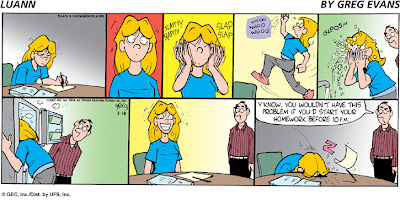
There have been some articles that have popped up recently that have given me pause. The tone of the articles is a blend of fatalism and pragmatism. What I like about the new tone however is the lack of blame.
It seems that the most inflammatory aspects of global warming, what causes the most screaming, is assigning cause and effect blame. I am not going to engage in that debate, there seems to be plenty of rhetoric about what is the cause of global warming that obscures the more important question "What should be our response to global warming?" In my opinion, informed by my general reading of both the scientific and popular press, global warming is happening.
It is true that I have never seen reports that properly accounted for the vast carbon dioxide and methane reserves in the oceans which are intimately linked to trivial changes in salinity and temperature. Forget the atmosphere, if the oceans ever decide that they don't like us they can turn the Earth into Venus in less than a century.
In my opinion, people that claim that global warming is not occuring can also claim a position with the earth centered Aristotlians that opposed Galileo and would not look through his telescope.

All in all, my position is:
If we did it ... we cannot fix it in our lifetimes so we have to figure out a way to survive.
If we didn't do it ... then we have to figure out a way to survive.
Yes, there is a strong political agenda at play
No, it is not clear that we are totally to blame ... but does that matter?
So what is a Christian, facing a warmer future with a responsible attitude towards the environment to do?
I do not think turning our lives inside out will do much good. And allowing people to cause panic just gives them a power they should not have.
My response is in two phases the first theological and second pragmatic.
First, if we consider instead a more simple question ... "How would God expect me to respond to a blessing?" we might be able to find wisdom.
God blesses us so that we might enjoy the blessing, that we might be encouraged in our service to Him, that we might show our love to Him by using the blessing to bless and encourage others.
Second, if we consider this good Earth to be a blessing from God then it seems straightforward:
Enjoy this good Earth as a blessing.
Find aspects of this good Earth that encourage us ... look up the stars or down at molecules ... either way we will find that God has not hidden his hand.
Respond to the blessing by making a simple ecological and environmental covenant:
Just as this good Earth has blessed me I must not allow my actions and my life to prevent it from doing the same for other that live with me or will come after me.
In my opinion, what happens next is just good stewardship.
TIME magazine has a remarkable article out now on simple, non-crazy things we can do personally or encourage regionally / nationally that show good stewardship as opposed to panic. It seems to make sense to me.
LINK TO THE TIME MAGAZINE ARTICLEReally, what responsible, calm response could we have?
BUY LAND / PLANT TREES. Probably the one most important thing you can do is make sure that at the end of your life you are responsible for more trees than less trees.
Live small ... reduce, re-use, recycle.
Eat local food. If God had wanted us to have fresh spinich in the winter he wouldn't have created e. coli.
Drive a small car that is well maintained.
CHANGE YOUR LIGHTBULBS NOW. You know, I just do not understand people. We knew the truth as children. The whole concept of the Easy Bake oven is that incandescent lightbulbs give off huge amounts of excess heat. Connect the dots for Pete's sake.
Use public transportation.
If you live in the country ... minimize your water use (domestic sewage in rural environments is a ticking timebomb that no one talks about)
If you live in the city ... turn on the taps. There are a number of reasons but most importantly is that the most clean and aggressively protected wild areas near cities are the protected watersheds for municiple water systems. Secondly water is a renewable resource and lack of clean water elsewhere in the world is a stupid reason for those that have lots limit its use ... it is clean water habitat that we need to conserve as aggresively as possible.
Stop treating flushes and drain as magic holes that transport everything you don't want to someplace you don't care about.

Panic Bad.
Crazy Bad.
Blessing Good.





















